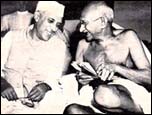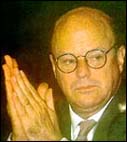'The habit of unsparing, and often unfair, criticism of government
servants is one of the characteristics America and India share'
 In 1958 we returned to the United States. Just before we left,
two of the senior professors at the college came to see me and
asked why I was leaving. As one of them put it, "Why are
you leaving now that you have studied our language and history
and are beginning to understand us?" The other man said:
"Perhaps that is why he is leaving." And of course he
was right: the more we understood, the more we realised that we
could never truly be part of India.
In 1958 we returned to the United States. Just before we left,
two of the senior professors at the college came to see me and
asked why I was leaving. As one of them put it, "Why are
you leaving now that you have studied our language and history
and are beginning to understand us?" The other man said:
"Perhaps that is why he is leaving." And of course he
was right: the more we understood, the more we realised that we
could never truly be part of India.
But leaving India has meant forty years of absorption in teaching
and writing about India for a largely American audience. This
meant, first of all, being very intimately involved in the introduction
of knowledge about India at all levels into the American academic
curriculum, especially into the undergraduate curriculum.
This was part of a larger attempt by various educators who believed
that in addition to learning about Western civilisation, young
Americans should also have as part of their intellectual inheritance
a knowledge of the histories and culture of the great Asian civilisations.
As far as India is concerned, one visible proof of this concern
was the production of a large number of translations of works
from Indian languages, including the widely-used Sources of
Indian Tradition.
Teaching about Indian culture and civilisation to American students
became my way of life, but it was always coloured by the original
involvement in modern Indian life. This led, almost inevitably,
to a concern that two great nations, the United States and India,
should move towards a relationship based on mutual understanding
and respect of the other's way of life. Quite specifically, such
a relationship requires that the two nations recognise that each
has its own goals and national interests, and that these will
very often not only coincide, but that they will come in conflict.
Whenever I hear politicians, Indian or American, talking about
how India and the United States will get on with each other because
they are the world's two great democracies, I know that they have
missed the fundamental point that sharing similar political processes
for determining their rulers, does not mean that the two countries
will share common paths or methods in pursuit of their national
interests. Systems of government were not a factor in determining
American or Indian relations with the Soviet Union, China, or
Pakistan, but, on both sides, perceptions of national interest,
whether or not these were really true to the national interest
were.
It was concern, then, for relations between the two countries
that led me, like many American academics, to involvements beyond
classroom teaching and academic writing. These involvement's have
been of two kinds: working with American academic programs in
India and working with the American government. Of the enterprises
relating to scholarly research and academic exchanges, three have
been of particular importance: the American Institute of Indian
Studies, the Fullbright Program, and the Indo-American Subcommission.
All of them were seen, I think, by those of us involved in their
direction, as contributing to a relationship between the two countries
based upon mutual knowledge and respect. At times, however, the
visits of American scholars to India engendered disputes and bitterness
when visas were refused or delayed because of the kind of studies
that some American academics wanted to pursue. Overall, however,
looking back over the scholarly activities of Americans in India
I am utterly convinced that it remains one of the most fruitful
examples of cultural interaction that any two countries have undertaken,
even if marked by misunderstandings. It is still largely an untold
story.
For American academics, moving in and out of government service
is more common than in many other countries, including India,
and I think I have been uncommonly fortunate in my opportunities.
(Having said earlier that I began my India experience as a Canadian,
I should add that, in the language of the American immigration
service, I forswore allegiance to 'foreign potentates'
in 1965 so that I could participate fully in the Indo-US dialogue).
From 1978 to 1980, I served as cultural counsellor in Delhi, one
of the half dozen or so such posts throughout the world usually
held by an academic.
The position gave special access to many levels of Indian cultural
life as well as academia, and it reinforced my long standing respect
for Indian academics and widened my knowledge of other aspects
of modern Indian culture, particularly the very high calibre of
Indian journalists. I am convinced that the English language press
has levels of sophistication rarely met elsewhere in the English-speaking
world.
I want to mention, at a time of great criticism of the bureaucracy
in the press, that then, as later, I was greatly impressed by
the ability of many of the members of the government services.
The habit of unsparing, and often unfair, criticism of government
servants is one of the characteristics America and India share.
My final formal involvement was the opportunity to go to India
in 1994-95 with the new American ambassador, Frank Wisner, in
the post that he created as his special consultant. I am quite
uncertain as to any value I was to him, but it gave me the extraordinary
opportunity for a front seat, as it were, at a time when rapid
and unprecedented changes were taking place in Indo-US relations.
 As Blitz, a journal not noted for its friendly attitude
towards the United States correctly put it, Ambassador Wisner
"was the right man in the right job at the right time,"
and I profited by it. In my other incarnations, I had gained knowledge
and respect for academics, bureaucrats and journalists, and this
time I was impressed by two groups with which I previously had
little contact - business people and military leaders.
As Blitz, a journal not noted for its friendly attitude
towards the United States correctly put it, Ambassador Wisner
"was the right man in the right job at the right time,"
and I profited by it. In my other incarnations, I had gained knowledge
and respect for academics, bureaucrats and journalists, and this
time I was impressed by two groups with which I previously had
little contact - business people and military leaders.
Reading the Indian press, I am aware of the dark forebodings expressed
by many India journalists and academics for the future of Indo-American
relations. As an outsider -- but as one deeply interested in India-looking
back across the years since 1947 it seems to me, however, that
the two countries have constructed a foundation, despite many
false starts, for a relationship based on a realistic understanding
of each other's national interests, cultures, and social values,
that can withstand the winds of even violent changes from both
quarters.
Ainslie T Embree, professor emeritus of history, Columbia
University, was chairman of the history department, director of
the Southern Asian Institute; associate dean of the school of
international and public affairs (1972-78) and acting dean, (1989-90).
He was president of the American Institute of Indian Studies and
president of the Association of Asian Studies. From 1978 to 1980
he was counsellor for cultural affairs at the American embassy
in Delhi, and in 1994-95, special consultant to the American ambassador.
Courtesy: New India Digest
|

